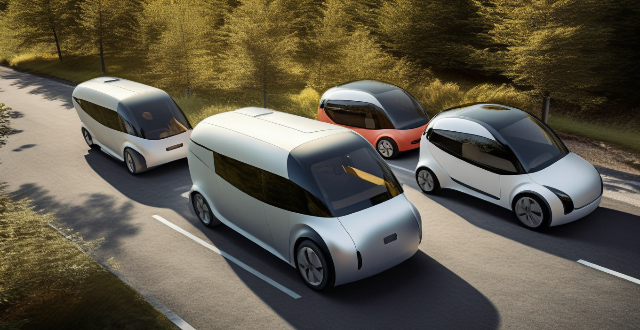Electric and hybrid cars are becoming increasingly popular as people become more aware of the environmental impact of traditional gasoline-powered vehicles. These alternative vehicles have the potential to significantly reduce carbon emissions from transportation, which is one of the largest contributors to global warming. In this article, we will explore the role that electric and hybrid cars play in reducing carbon emissions from transportation.

The Role of Electric and Hybrid Cars in Reducing Carbon Emissions from Transportation
Electric and hybrid cars are becoming increasingly popular as people become more aware of the environmental impact of traditional gasoline-powered vehicles. These alternative vehicles have the potential to significantly reduce carbon emissions from transportation, which is one of the largest contributors to global warming. In this article, we will explore the role that electric and hybrid cars play in reducing carbon emissions from transportation.
Electric Cars
How Do They Work?
Electric cars, also known as battery electric vehicles (BEVs), run solely on electricity stored in a battery pack. They do not produce any tailpipe emissions during operation, making them a cleaner alternative to gasoline-powered vehicles.
Benefits for Reducing Carbon Emissions
1. Zero Tailpipe Emissions: Electric cars produce zero tailpipe emissions during operation, which means they do not contribute to air pollution or greenhouse gas emissions while driving.
2. Lower Well-to-Wheel Emissions: Even when considering the emissions associated with electricity generation, electric cars generally have lower well-to-wheel emissions compared to gasoline-powered vehicles. This is because electricity can be generated from renewable sources such as wind, solar, and hydropower, which have much lower emissions than burning fossil fuels.
3. High Energy Efficiency: Electric motors are more efficient than internal combustion engines, converting more of the energy stored in their batteries into motion. This means that electric cars require less energy to travel the same distance as gasoline-powered vehicles, further reducing their carbon footprint.
4. Regenerative Braking: Many electric cars use regenerative braking systems that capture some of the energy normally lost during braking and use it to recharge the battery. This helps to improve the overall efficiency of the vehicle and reduce its energy consumption even further.
5. Support for Renewable Energy Sources: As demand for electric cars grows, so does the demand for renewable energy sources to power them. This encourages investment in clean energy technologies and helps to accelerate the transition away from fossil fuels.
Hybrid Cars
How Do They Work?
Hybrid cars combine a conventional internal combustion engine with an electric motor powered by a battery pack. They can operate on electricity alone at low speeds or combine both power sources for greater efficiency and performance at higher speeds.
Benefits for Reducing Carbon Emissions
1. Improved Fuel Efficiency: Hybrid cars are designed to maximize fuel efficiency by using the electric motor for low-speed driving and idling, reducing the amount of time the gasoline engine needs to run. This results in lower fuel consumption and fewer carbon emissions compared to traditional gasoline-powered vehicles.
2. Reduced Idling Emissions: When stopped at traffic lights or in heavy traffic, hybrid cars can shut off their gasoline engine and rely on the electric motor instead, eliminating idling emissions altogether.
3. Regenerative Braking: Like electric cars, many hybrid vehicles also feature regenerative braking systems that capture energy normally lost during braking and use it to recharge the battery. This helps to improve overall efficiency and reduce energy consumption.
4. Lower Well-to-Wheel Emissions: While hybrid cars still produce some tailpipe emissions, their overall well-to-wheel emissions are generally lower than those of comparable gasoline-powered vehicles due to their improved fuel efficiency and reduced reliance on gasoline.
Challenges and Considerations
While electric and hybrid cars offer significant benefits for reducing carbon emissions from transportation, there are still some challenges and considerations to address:
1. Electricity Generation: The effectiveness of electric cars in reducing carbon emissions depends largely on how the electricity used to charge them is generated. If it comes primarily from coal-fired power plants, then the overall reduction in carbon emissions may be less significant than if it comes from renewable sources.
2. Battery Production and Disposal: The production of lithium-ion batteries used in electric and hybrid cars requires significant amounts of energy and raw materials, which can have environmental impacts of their own. Additionally, proper disposal or recycling of these batteries is essential to minimize their environmental footprint over their entire lifecycle.
3. Infrastructure Development: Widespread adoption of electric cars requires significant investment in charging infrastructure, including public charging stations and home charging equipment. This development must keep pace with growing demand to ensure that drivers have convenient access to charging options.
4. Upfront Costs: Electric and hybrid cars often have higher upfront costs than traditional gasoline-powered vehicles, which can be a barrier to entry for some consumers. However, these costs are expected to decrease as technology advances and production scales up.
5. Range Anxiety: Early electric cars had limited range capabilities, leading to concerns about running out of power before reaching a charging station (known as "range anxiety"). While modern electric cars now offer much greater ranges, this issue still affects some consumers' perceptions and purchasing decisions.
In conclusion, electric and hybrid cars play a crucial role in reducing carbon emissions from transportation by offering cleaner alternatives to traditional gasoline-powered vehicles. As technology continues to advance and infrastructure develops, these vehicles are likely to become even more prevalent and effective at combating climate change caused by transportation-related emissions.